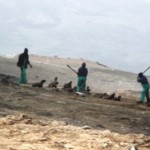News release for issue Sunday 27 October 2013
80,000 SEAL PUPS SAY CLUBBING’S NO ADVENTURE AS ATTA SUMMIT BEGINS IN NAMIBIA
The decision by the Adventure Travel Trade Association to hold their annual Adventure Travel World Summit in Namibia this year has angered and disappointed campaigning organisations like Earthrace Conservation and The Seals of Nam.
The Summit, which started yesterday (Saturday 26 October) is being billed by ATTA as an occasion to ‘Imagine, Inspire, Invest’, while Namibia itself is highlighted by them as a country that ‘has earned deserved recognition for one of the greatest wildlife recovery stories ever witnessed’.
What sponsors, delegates or attending media have not been told however, is that Namibia is also the country in which the largest legal slaughter of wildlife in Africa, and second largest in the world, takes place.
Every year, the Ministry of Fisheries allows a quota of 80,000 seal pups (some still nursing) to be clubbed, and 6,000 bulls to be shot. It is not the quick and painless process that the Ministry and the sealers maintain it is as this new undercover footage of the hunt, shot by Earthrace, reveals. (Warning: upsetting scenes http://bit.ly/HnPRHX).
The Seals of Nam and Earthrace Conservation contacted all sponsors and listed media attending the Summit in advance, providing facts about the seal hunt. A twitter campaign was also initiated by Seals of Nam, supported by Earthrace and other organisations and individuals around the world, that saw a flurry of activity on the opening day with tweets including #sealhunt trending in Germany, along with #ATWS2013.
Pete Bethune, founder of Earthrace Conservation, said, “Holding the Adventure Travel World Summit in Namibia is unforgivable. How can an organisation whose own ‘Values Statement’ (1) says that one of the three main components for the traveller is ‘a connection to nature and the environment’, feel comfortable inviting it’s members, guests, sponsors and International media to Namibia while hiding this dirty, bloody secret?”
Each year, around 1 million tourists visit Namibia. Most come from South Africa (around one in three) followed by tourists from Germany, the USA, and United Kingdom, followed by Italy and France.
However, only one organisation within the industry – Ethical Traveller – has publicly recognised the incongruity of highlighting Namibia as a place to visit while the seal hunt continues, refusing to include the country in its annual list of the world’s best ethical destinations. (2)
Mia du Plessis, from Seals of Nam said, “The phrase ‘ethical travel’ is bandied about by the entire travel industry like confetti. Isn’t it about time the trade took a long hard look at what they think means when it come to protection of wildlife and eco-systems alike?
“The industry has a responsibility to be ethical towards its customers – not telling them about something as shocking as the seal hunt is as unethical as lying to them. People actively seeking travel destinations while being mindful of their footprint deserve better”.
Bethune concluded, “Namibia should have a travel industry-led ‘wildlife health warning’ plastered all over it. Instead, ATTA is actively promoting it as a favoured destination by holding the Summit there. They might as well have put branded clubs into sealskin goody bags and handed them out to all their delegates and the media.”
